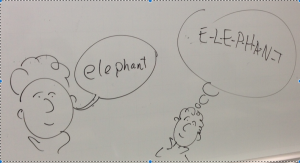This year I am back to teaching a class on presentation skills.
Some presentation classes focus on collecting your content and organizing it well, along with preparing it for the proper audience.
We do that, too, but in my class we also talk about the importance of stress, tone, pitch, and accents when speaking to help people understand better.
English can be understood more easily than many Asian languages for the simple fact that accents and tones and pitch help listeners to decipher which words are the most important and where the meaning is really coming from.
Here’s a little drill I created to help students practice emphasizing different words to move meaning and to help listeners to understand them better.
Before the class, I created several sentences of varying length. Each of the sentences had no repeated vocabulary. This is a little challenging with the repetition of so many prepositions and articles in English, but I was able to fashion several rather lengthy sentences to meet this requirement.
Then I had the students repeat the sentences word by word and move the accent from the first word to the last as they went. We did this by having one student do the same sentence alone from beginning to end and also by going around the room and having the students take turns and having to accent the word following the one that had been accented in the previous speaker’s sentence.
Here’s a quick example:
He wants chocolate cake.
He wants chocolate cake.
He wants chocolate cake.
He wants chocolate cake.
Now, you can also do this by creating a rising, questioning tone on each word as well to change the emphasis.
So “He? wants chocolate cake.” (This is a question about ‘who’ wants chocolate cake.)
He wants? chocolate cake. (This is a question about whether or not he ‘wants’ chocolate cake.)
He wants chocolate? cake. (This is a question about what kind of cake he wants. Chocolate, of course ;-))
He wants chocolate cake? (This is a question about what kind of chocolate food he wants.)
Now, this might seem trivial, but it is useful, and if done quickly and in turns, a fun and engaging exercise for class.








